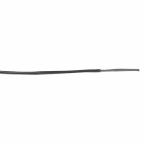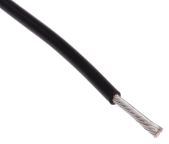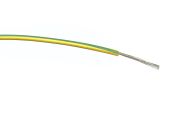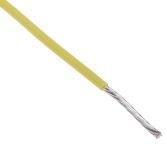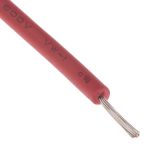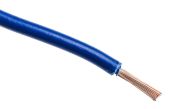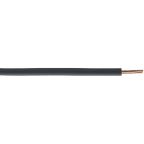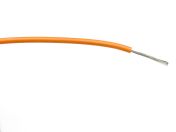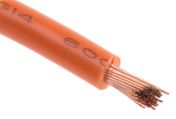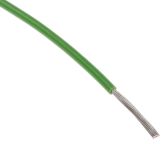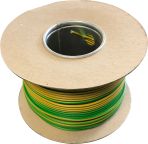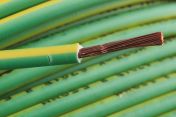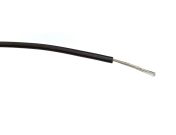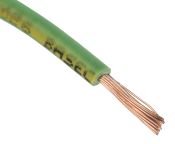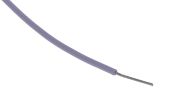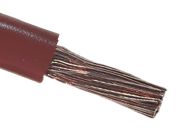Hook Up Wire
Hook-up wire is insulated wire commonly used for electrical connections. It can have a solid or stranded core made of materials like copper or aluminium and is covered with protective insulation, such as PVC (polyvinyl chloride) or Teflon (PTFE). To learn more about wiring colours, see our Guide to UK Electrical Wiring Colours.
Hook-up wire is available in various gauges (wire diameters) and colours to facilitate easy organisation within electrical circuits. Heavier gauge wire, also known as equipment wire, has a thicker conductor and is designed to handle higher currents and voltages, ideal for powering large electrical equipment. The colour coding often follows industry standards or specific conventions, such as red for positive (+) connections and black for negative (-) connections in direct current (DC) circuits.
At RS, we're your one-stop shop with the largest range of cabling solutions. Our extensive hook-up wire range features trusted brands, including LAPP, TE Connectivity, Alpha Wire, and our quality brand RS PRO with fast and free delivery available on orders over £50.
What are the types of hook-up wire?
Here are some common types of hook-up wire:
- Single Conductor Wire: This is the most basic type of hook-up wire, consisting of a single insulated conductor. Single Conductor Wire suitable for general-purpose use and available in various gauges and insulation materials.
- Stranded Wire: Stranded hook-up wire is made up of multiple smaller strands of wire twisted together. This construction makes it more flexible and suitable for applications where the wire may need to bend or flex.
- Solid Wire: Solid hook-up wire consists of a single, solid conductor. It's less flexible than stranded wire but is preferred in situations where minimal signal loss or resistance is crucial, such as in high-frequency applications.
- Shielded Wire: This type of wire has an additional layer of shielding, typically made of metal, around the insulated conductor. Shielded wire is used to protect against electromagnetic interference (EMI) and radio frequency interference (RFI). It's commonly used in audio and communication applications.
- High-Temperature Wire: For applications where extreme heat resistance is required, high-temperature hook-up wire is used. These wires are designed to withstand temperatures significantly higher than standard wire.
- Multi-Conductor Cable: While not technically a type of hook-up wire, multi-conductor cables consist of multiple insulated conductors bundled together within a single cable.
- Specialty Wire: Some applications require speciality hook-up wire, such as magnet wire (enamel-coated wire used in electromagnets and transformers) or automotive-grade wire (designed for use in vehicles).
- Harsh Environment Wire: refers to electrical wiring and cables designed specifically for use in extreme or challenging environmental conditions. These conditions can include exposure to high temperatures, moisture, chemicals, physical abrasion, and other harsh factors that standard wires may not withstand.
Hook-up Wire Applications
These wires are used in various applications, from simple breadboard prototypes to complex electronic devices.
- Internal Wiring of Appliances
- Automotive Applications
- Robotics and Automation
- Aerospace
- Medical
Need help to select the right cable? Check out our Copper Cables Guide and Electrical Wiring Regulations Guide for expert advice.
Popular Searches
Related links
- RS PRO Blue 0.75mm² Hook Up Wire 24/0.2 mm PVC Insulation
- RS PRO Grey 0.75mm² Hook Up Wire 24/0.2 mm PVC TI3 Insulation
- RS PRO Dark Blue 0.75mm² Hook Up Wire 22/1.0 mm Polyolefin Cross-linked EI5 Insulation
- RS PRO Black 1.5mm² Hook Up Wire 30/0.25 mm PVC Insulation
- Single Core Cable
- RS PRO Black 1.5mm² Hook Up Wire 7/0.53 mm PVC Insulation
- RS PRO Black 16mm² Hook Up Wire 126/0.4 mm PVC Insulation
- Lapp ÖLFLEX HEAT Series White 1.5 mm² Hook Up Wire 19/0.25 mm Silicone Insulation, 51105

